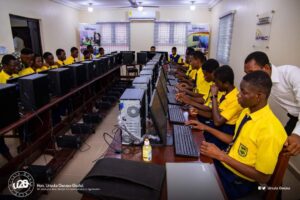- Joins Ursula to honour mother with library, technology hub
Vice President, Dr Mahamudu Bawumia has joined the Minister for Communications and Digitalisation, Ursula Owusu-Ekuful, to inaugurate the Christina Akua Brago Diawuo Library and Technology Hub in honour of her mother.
Speaking at the state-of-the-art edifice’s inauguration in Akim Oda in the Eastern Region, Dr. Bawumia said digitalisation is critical to the country’s future. The Vice President said this initiative will undoubtedly shape the community’s future, complementing government’s mission to digitise all sectors of the economy by equipping the youth with ICT skills.
“Digitalisation is the future of the globe. Hence, there is a need to equip our youth to be prepared for the competition ahead,” Dr. Bawumia said. “The government of Ghana has prioritised education and deliberately made efforts in motivating girl-child education.”
The facility comes with a Huawei Idea Hub, and will serve as a valuable resource for local schools by providing students with access to virtual learning experiences and allowing them to connect with other students from different parts of the world.
The facility is funded by the Ghana Investment Fund for Electronic Communications (GIFEC), Huawei Ghana, MTN Ghana and the Ghana Library Authority.

On his part, the Administrator of GIFEC, Prince Ofosu Sefah, said the project will significantly reduce disparity in access to ICT between urban and rural populations in Ghana.
“It will also ensure that the impact of ICT is felt in every facet of citizens’ lives; in education, health, commerce, agriculture and even entertainment, as ICT remains a key factor in the economic and social development of countries because it has positive effects on economic growth, productivity and employment,” he said.
GIFEC, since its establishment, has provided innovative solutions to ensure universal access and digital inclusion in the country’s remotest parts and to all marginalised communities through three main programme areas: infrastructure development, equipment and resource provision, and capacity building.
Again, in an attempt to provide basic and intermediate skills to enable students use digital technologies in more meaningful and beneficial ways, GIFEC has since 2017 to date equipped ICT laboratories for over 947 basic and senior high schools to improve teaching and learning of ICT, with 91 in the Eastern Region alone.
Through this initiative, a total of about 17,000 citizens from various backgrounds have been trained in various ICT programmes across the country. It has also facilitated the Girls in ICT Programme, which has trained about 8,000 girls and 800 teachers.

Its Digital Transformation Centres Programme (DTC), implemented in partnership with the ITU, CISCO and NORAD, has also trained 10,000 citizens across the country.
Brian Wulang, Director of Enterprise Business, Huawei, expressed the company’s excitement to be part of “this incredible initiative aimed at promoting digital literacy and empowering individuals, especially the youth, to unlock their full potential”.
“The youth are our future, and the onus lies on us to ensure that they have the right tools and skillset to excel in the future. As the world is on a digital quest to advance and transform societies, we believe that technology should be available and accessible to all,” said Wulang.
For many years, Huawei has been at the forefront of technological innovation and is passionate about leveraging technology to improve people’s lives.










